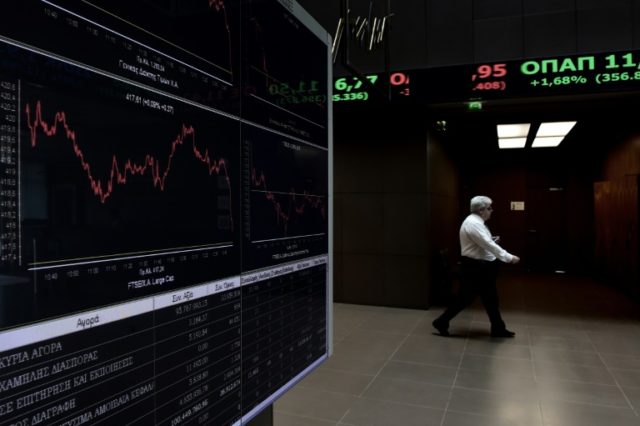Paris (AFP) – Global investors are piling into sovereign bonds amid concerns about Brexit and sluggish growth, pushing rates of return close to zero and even into negative territory, creating an unprecedented situation with unknown consequences.
The yield or rate of return on the Bund, Germany’s 10-year government bond, hit 0.02 percent on Friday morning in trading on the secondary market.
“The historic moment” where it hits zero “doesn’t seem more than a question of time”, according to economists at German bank LBBW.
Interest rates on sovereign debt have been low for some time as central banks snap up government bonds from investors in an effort to boost economic growth through increased liquidity in a policy known as quantitative easing or QE.
The rate of return on Bunds first fell under 1.0 percent in 2014.
But be it in Japan, the United States, Switzerland or Britain, the rate of return for sovereign bonds of most major industrialised nations are striking new record lows on a daily basis on the the secondary market were investors trade debt after it is first issued.
Analysts say the ongoing downward push, which may yet take the Bund yield into negative territory, is the result of a renewed bout of jitters about the global economy.
“Three factors explain the plunge in bond yields: a speech by ECB chief Mario Draghi at the beginning of this week, risk aversion and increased market volatility ahead of the British referendum,” said Vincent Ganne, an analyst at FXCM currency brokerage.
“There was also contagion from lower US rates since the publication of the latest report on the US jobs market,” he added.
A dismal jobs report in the United States earlier this month raised questions about the recovery there and put an increase in interest rates on hold until the autumn, sending the yields on treasuries tumbling.
Recent Chinese economic data has also been lacklustre, and international institutions have been cutting their global growth forecasts.
– Risk aversion & safe havens –
Meanwhile the latest polls put the June 23 referendum vote on Britain leaving the European Union at a toss-up.
Investors abhor uncertainty, and in such situations often search out so-called haven investments perceived as offering security.
This includes highly-rated sovereign bonds, and the competition by investors has sent prices up and therefore the rates of return down.
Investors are “searching for quality” said Gilles Moec, chief economist at Bank of America-Merrill Lynch, calling the reflex “quite a widespread phenomenon”.
The yield on Japanese and Swiss 10-year sovereign bonds have already fallen into negative territory.
While on the surface this confounds financial logic — as buying a bond at negative yield means accepting a loss if holding the bond until redemption — it provides insurance to investors if they fear prices of other assets will fall by even more.
More than 10 trillion dollars worth of sovereign debt was yielding a negative return at the end of May, according to the Fitch ratings agency.
– Supernova –
This amount of negative yields is pushing the world of investment into uncharted territory, raising alarm bells with some market watchers.
Bill Gross, the so-called Bond King at investment fund Janus Capital and previously at the massive investment fund Pimco, recently warned that the situation “is a supernova that will explode one day”.
In other words, the stampede into bonds could be followed by a stampede out.
The head of the German central bank, Jens Weidmann, has sounded a warning about a rising risk of a reversal and “large jumps in risk premiums” as large investment funds shift money in and out of bonds depending the outlook for central banks changing interest rates.
The yield on sovereign debt is normally supposed to be a reflection of inflation expectations, but as it increasingly becomes a haven investment the yield becomes more of a signal of expectations of changes in central bank monetary policy.
And should central banks reverse their current low-rate policies, investors in bond markets would be vulnerable to sharp losses.
European Central Bank chief Mario Draghi’s call this week for government fiscal action to help kickstart eurozone growth was taken as a sign that the ECB’s arsenal is running low following the launch of its unprecedented purchases of corporate bonds as a way to stimulate the economy.
Frederik Ducrozet, an analyst at asset manager Pictet said the current situation was likely to continue “at least until the Brexit referendum” but that “it could quickly turn around”.

COMMENTS
Please let us know if you're having issues with commenting.